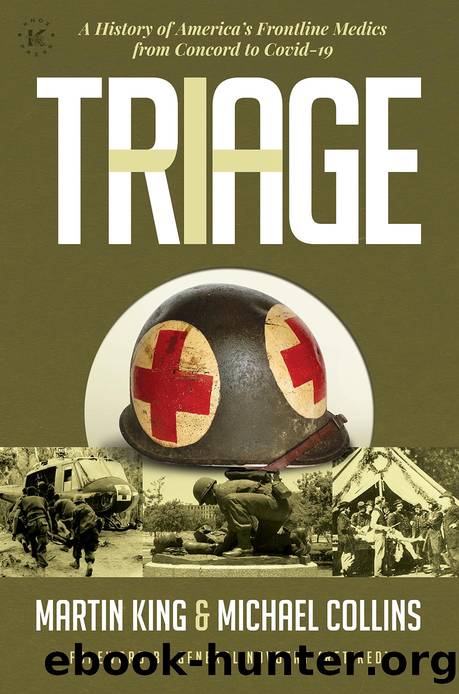Triage by Martin King & Michael Collins

Author:Martin King & Michael Collins [King, Martin & Collins, Michael]
Language: eng
Format: epub
Published: 2021-07-26T16:00:00+00:00
Chapter Thirteen
From Here to Hemingway
During the greater part of World War I from July 20, 1914, until November 9, 1917, General Cadorna was the Italian armyâs chief of staff. He was eventually relieved of command for his alleged role in Italyâs resounding defeat at the epic Battle of Caporetto. Cadorna allegedly executed more of his own men than all the other incumbent armies together. Between 1915 and 1917, more than half a million Italian soldiers met violent deaths on what was known as the âIsonzo Front.â Hundreds of thousands more succumbed to disease, hunger, freezing temperatures, and avalanches. Hemingway vividly referred to the aftermath of the Battle of Caporetto in his famed novel A Farewell to Arms, but he wasnât actually there at the time.
On April 6, 1917, the United States declared war on Germany. That day, the American Red Cross (ARC) renounced its neutrality and assumed its other federally-chartered military role to provide medical assistance to the countryâs armed forces in wartime. It looked good on paper, but in reality, just like the U.S. armed forces, the organization was drastically ill prepared for the role it was assuming. Itâs entirely possible that Hemingway saw the ARC has a possible vehicle to get to the front faster than the army. Six base hospitals had already been dispatched to support the British Expeditionary Force in May 1917. Most, if not all, of these Red Cross hospitals were already operating as American-sponsored independent institutions even before Americaâs entry into the war. The first of these to be appropriated by the Army and ARC was the âAmerican Ambulance in Paris.â The order came directly from Major General âBlack Jackâ John J. Pershing, commander of the American Expeditionary Force.
In 1917 a young man from Illinois called Ernest Miller Hemingway left his job at the Kansas City Star newspaper, and signed on as an ambulance driver with the American Red Cross. He was eighteen, eager for action and adventure and responding to a recent recruitment drive. He had attempted to enlist in the army, but had been rejected due to poor vision, undeterred he would get to the front. Many believe that Hemingway harbored a pure undiluted determination to join the fray and get stuck in, but this wasnât the case at all. As far as he was concerned the location of the front was superfluous, the fight was on and he wanted to get close (but despite his pugnacious attitude to just about everything he didnât want to get too close). In desperation to join up in some form or another, he had even written to his sister explaining that he was planning to join the Canadian army. He settled for the National Guard but soon discovered that they had no intention whatsoever of getting sent overseas. Hemingway was bitterly disappointed.
According to one version of Ernest Hemingwayâs account, one day a wire service story came to the telegraph desk, dealing with the Red Crossâs need for volunteers to work with the Italian Army; being
Download
This site does not store any files on its server. We only index and link to content provided by other sites. Please contact the content providers to delete copyright contents if any and email us, we'll remove relevant links or contents immediately.
Spare by Prince Harry The Duke of Sussex(5200)
Navigation and Map Reading by K Andrew(5159)
Tuesdays with Morrie by Mitch Albom(4787)
Machine Learning at Scale with H2O by Gregory Keys | David Whiting(4314)
Cracking the GRE Premium Edition with 6 Practice Tests, 2015 (Graduate School Test Preparation) by Princeton Review(4296)
Never by Ken Follett(3960)
Goodbye Paradise(3812)
What It Really Takes to Get Into Ivy League and Other Highly Selective Colleges by Hughes Chuck(3762)
Fairy Tale by Stephen King(3401)
Harry Potter and the Prisoner of Azkaban (Book 3) by J. K. Rowling(3362)
Pledged by Alexandra Robbins(3179)
Kick Ass in College: Highest Rated "How to Study in College" Book | 77 Ninja Study Skills Tips and Career Strategies | Motivational for College Students: A Guerrilla Guide to College Success by Fox Gunnar(3131)
Reminders of Him: A Novel by Colleen Hoover(3122)
A Dictionary of Sociology by Unknown(3085)
Sapiens and Homo Deus by Yuval Noah Harari(3078)
The Social Psychology of Inequality by Unknown(3034)
Will by Will Smith(2924)
Graduate Admissions Essays, Fourth Edition: Write Your Way into the Graduate School of Your Choice (Graduate Admissions Essays: Write Your Way Into the) by Asher Donald(2923)
Zero to Make by David Lang(2786)
